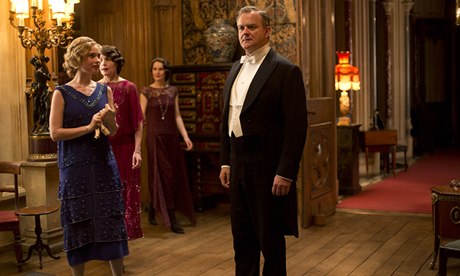
Estate of play … Lily James, Michelle Dockery and Hugh Bonneville in Julian Fellowes's Downton Abbey. Photograph: Nick Briggs
For those starting to wonder if Downton is in danger of going on so long that it catches up with the 21st century, there is one book that reveals Fellowes's motivations, intentions and predilections: The Shooting Party by Isabel Colegate. Set in 1913, the novel comprises one day in the life of a large country house. The men are guffawing and shooting, the ladies are frostily lunching and servants dart hither and thither like beleaguered nymphs as Colegate meditates on Fellowes' favourite themes: frustration, friction between the classes, tradition v progress, and the imminent disintegration of an aristocratic world. The day culminates in a moment of tragedy that tugs at the tightly woven lives of the masters and their servants and forces both groups to realise the extent of their dependence on each other.
When The Shooting Party was published in 1980, the popular representation of the aristocracy was as a bunch of bungling toffs: weak chins and weak morals abounded, while servitude was either mocked or ignored. Colegate, however, chose to dispense with these tropes and present everyone as humans instead of saints or villains. The book, written at the height of Thatcherism, is a precursor to Fellowes's forelock-tugging that shows both poor and rich characters in a sympathetic light.
In his introduction to the 2004 edition of The Shooting Party, Fellowes was quick to acknowledge that his screenplay for Gosford Park owed a great deal to the film adaptation of Colegate's novel: "without it the seed of the idea behind my script would never have been allowed to germinate". However, at the time of writing Gosford Park Fellowes had not yet read the book, and in Robert Altman was working with a director notorious for his fractious relationships with screenwriters. As a result of Fellowes's novice status and Altman's heavy hand on the tiller, Gosford Park ended up owing far more to Agatha Christie's whodunnits than to Isabel Colegate.
Once Gosford Park had hoovered up its Oscar nominations and Fellowes had completed the transformation from actor to respected screenwriter, he finally got around to actually reading The Shooting Party. The result is that Colegate's influence runs throughout the four series of Downton: the aristocratic family, the restless young women, the grouchy cook; entire scenes hanging on missing cufflinks. Kemal Pamuk, who vigorously romanced Mary in the first series, has a Colegate counterpart in Count Rakassyi, while Robert's overreliance on tradition echoes that of The Shooting Party's beleaguered host, Sir Randolph.
The similarities between Downton and The Shooting Party are most apparent in the final scene of the novel, when the landowner Lord Hartlip endangers the life of one of the gamekeepers by deviating from "the rules of the game". Fellowes, in turn, has developed all four series around Robert's well-meaning but near-disastrous mismanagement of Downton Abbey. Critics have griped about the amount of time spent discussing entails and dodgy overseas investments, but the series is largely powered by Robert's repeated gambling of the estate on shares and his constant hope that some woman, somewhere in his family, will produce a son.
It is the suggestion of dry rot within their protagonist families that links Fellowes and Colegate as writers and offers an insight into the eventual demise of Downton. Colegate is concerned with characters who are unable to break away from the established traditions, often at the expense of their own happiness. Everyone is trapped in the role assigned to them at the beginning of the book, and the result is a novel powered by nostalgia and pathos.
In his introduction, however, Fellowes takes this doomy outlook as a rallying cry: "If we cannot defend our own values against the trivial, fluctuating fashions in morality, then we are lost." While Lord Fellowes valiantly defends a life that was built upon the subjugation of the many and the profit of the few he is simultaneously steering Downton Abbey towards the same conclusion as The Shooting Party. With Robert reacting to Matthew's death and relinquishment of the estate in the manner of Augustus Gloop confronted with a chocolate river, Downton is once again in danger. The fun remains in deciding if Fellowes will stay true to Colegate's novel or if he will keep Downton afloat long enough for George Osborne to move in.
From The Guardian
No comments:
Post a Comment